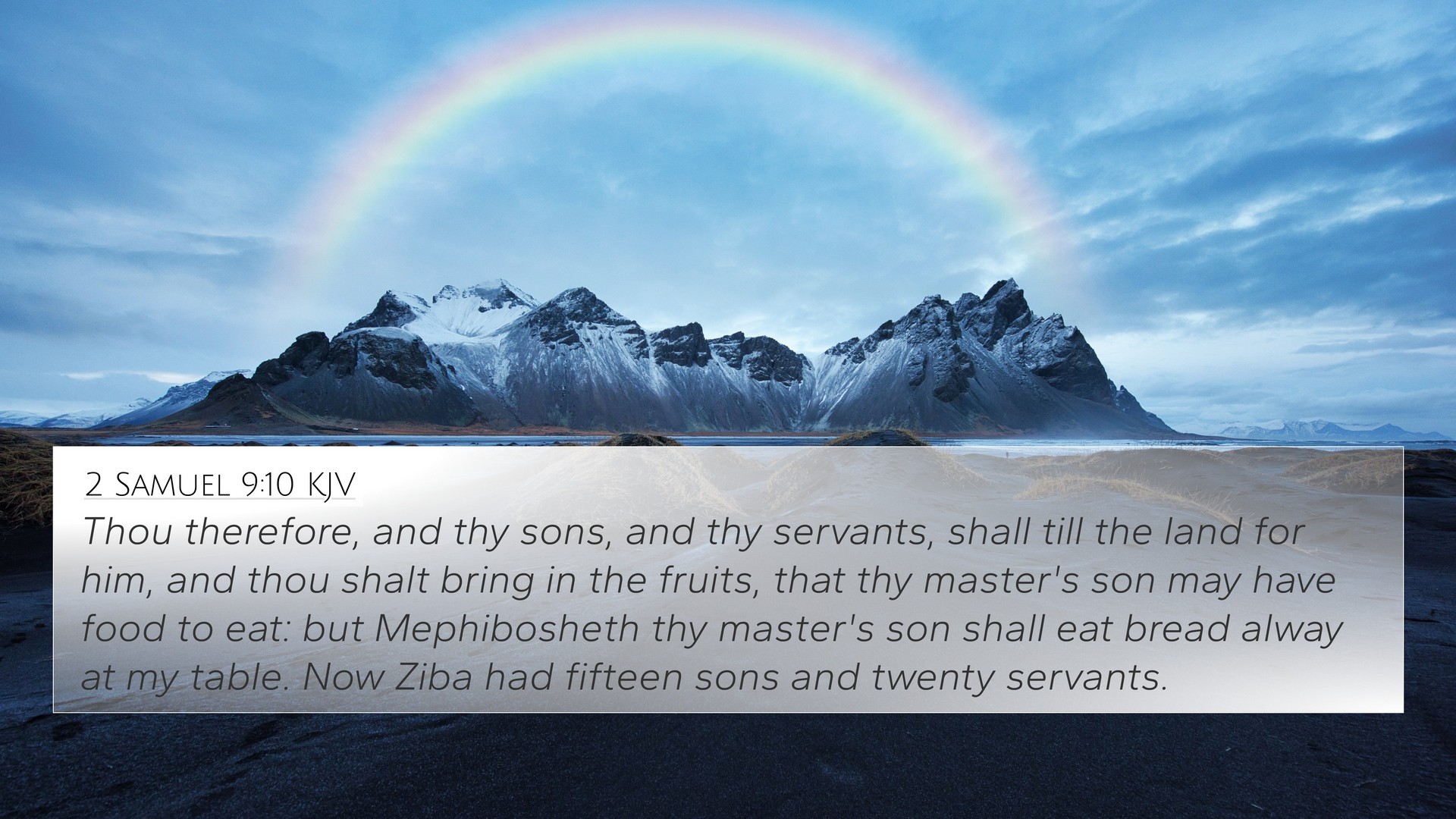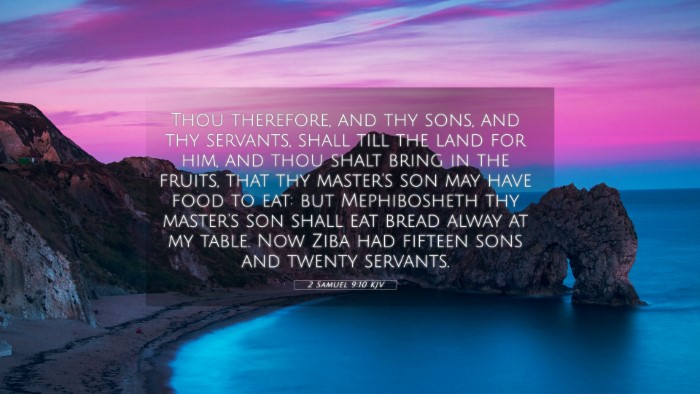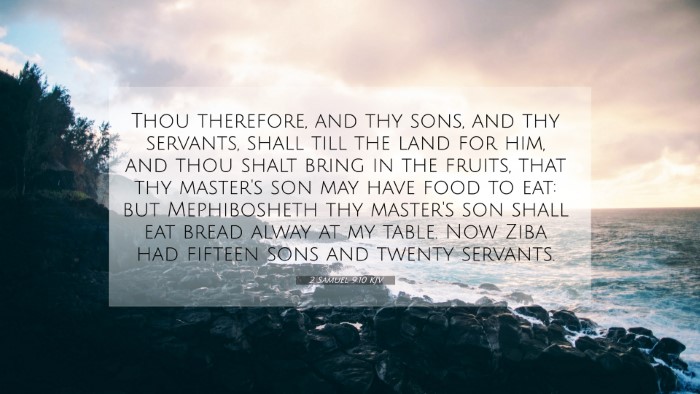Old Testament
Genesis Exodus Leviticus Numbers Deuteronomy Joshua Judges Ruth 1 Samuel 2 Samuel 1 Kings 2 Kings 1 Chronicles 2 Chronicles Ezra Nehemiah Esther Job Psalms Proverbs Ecclesiastes Song of Solomon Isaiah Jeremiah Lamentations Ezekiel Daniel Hosea Joel Amos Obadiah Jonah Micah Nahum Habakkuk Zephaniah Haggai Zechariah Malachi2 Samuel 9:10 Similar Verses
2 Samuel 9:10 Cross References
Thou therefore, and thy sons, and thy servants, shall till the land for him, and thou shalt bring in the fruits, that thy master's son may have food to eat: but Mephibosheth thy master's son shall eat bread alway at my table. Now Ziba had fifteen sons and twenty servants.
Uncover the Rich Themes and Topics of This Bible Verse
Listed below are the Bible themes associated with 2 Samuel 9:10. We invite you to explore each theme to gain deeper insights into the Scriptures.
2 Samuel 9:10 Cross Reference Verses
This section features a detailed cross-reference designed to enrich your understanding of the Scriptures. Below, you will find carefully selected verses that echo the themes and teachings related to 2 Samuel 9:10 KJV. Click on any image to explore detailed analyses of related Bible verses and uncover deeper theological insights.
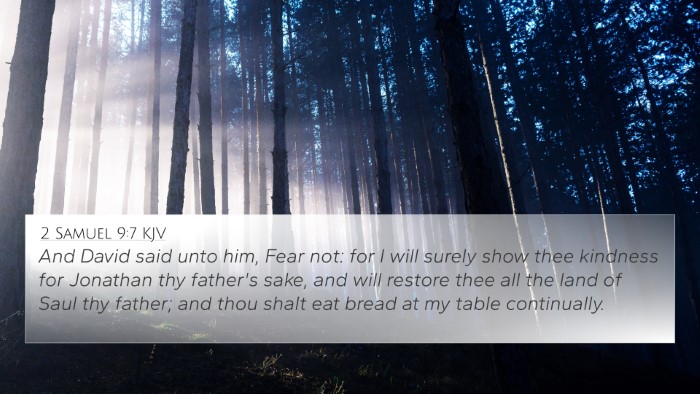
2 Samuel 9:7 (KJV) »
And David said unto him, Fear not: for I will surely show thee kindness for Jonathan thy father's sake, and will restore thee all the land of Saul thy father; and thou shalt eat bread at my table continually.
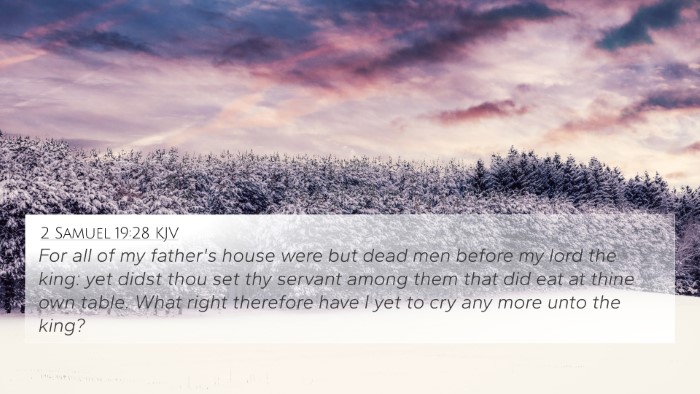
2 Samuel 19:28 (KJV) »
For all of my father's house were but dead men before my lord the king: yet didst thou set thy servant among them that did eat at thine own table. What right therefore have I yet to cry any more unto the king?
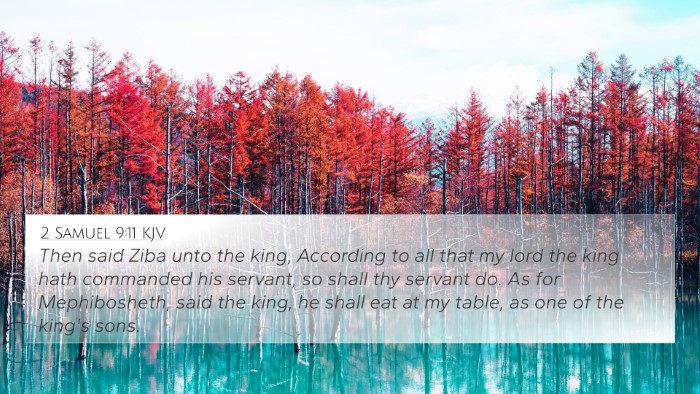
2 Samuel 9:11 (KJV) »
Then said Ziba unto the king, According to all that my lord the king hath commanded his servant, so shall thy servant do. As for Mephibosheth, said the king, he shall eat at my table, as one of the king's sons.
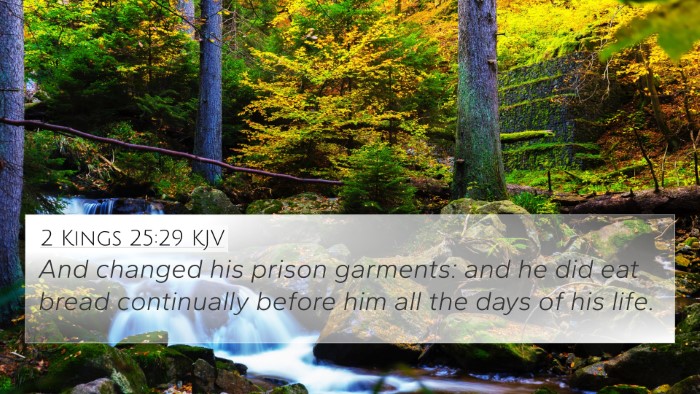
2 Kings 25:29 (KJV) »
And changed his prison garments: and he did eat bread continually before him all the days of his life.
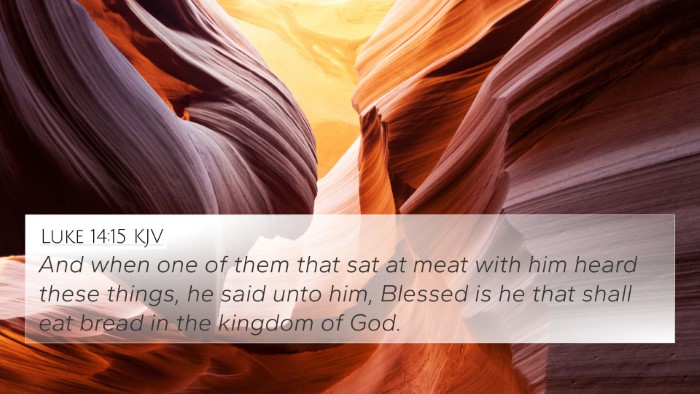
Luke 14:15 (KJV) »
And when one of them that sat at meat with him heard these things, he said unto him, Blessed is he that shall eat bread in the kingdom of God.
2 Samuel 9:10 Verse Analysis and Similar Verses
Understanding 2 Samuel 9:10
Text of the Verse: "And thou shalt eat bread at my table, as one of the king’s sons." - 2 Samuel 9:10
Overview of the Verse
This verse captures the profound gesture of kindness shown by King David towards Mephibosheth, the son of Jonathan. It symbolizes grace, mercy, and the restoration of relationship, which are significant themes in the biblical narrative.
Commentary Insights
Matthew Henry's Commentary
According to Matthew Henry, this verse reflects God's gracious dealings with His people. David's invitation to Mephibosheth showcases the mercy of the king towards someone who, by worldly standards, had no claim to such favor. It illustrates how God's grace lifts the downtrodden and offers them a place at His table, signifying acceptance and honor. Henry emphasizes that this act serves as an example of how Christ, as the true King, invites sinners to dine with Him, despite their unworthiness.
Albert Barnes' Commentary
Albert Barnes highlights the implications of Mephibosheth eating at the king’s table. He points out the symbolic act of inclusion, portraying Mephibosheth as part of David’s household. Barnes also remarks on the significance of this arrangement matching God's covenant with Jonathan, Mephibosheth's father. This demonstrates God's faithfulness in keeping promises and shows how His mercy extends beyond human expectations, providing a parallel to the New Testament themes of grace and redemption.
Adam Clarke's Commentary
Adam Clarke elaborates on the cultural context of dining with a king. Sharing bread at a royal table meant not only physical provision but also honoring relationships and familial connections. Clarke notes that this act was particularly significant given Mephibosheth’s physical disability and the societal stigma attached to it. This highlights the theme of divine grace transcending human limitations, echoing the overarching biblical narrative of inclusion and love.
Thematic Connections and Bible Cross-References
- 2 Samuel 4:4: Introduces Mephibosheth and his condition, underscoring God's care for the marginalized.
- 2 Samuel 9:7: David’s assurance to Mephibosheth that he will not fear, revealing themes of comfort and security.
- 1 Samuel 20:14-17: Jonathan’s request to David to show kindness to his descendants reflects the covenant between David and Jonathan.
- Luke 14:13-14: Jesus speaks of inviting the poor, indicating a continuation of the theme of grace and inclusion.
- Romans 5:6-8: Paul discusses Christ’s sacrifice, marking the ultimate expression of grace for the unworthy.
- John 1:12: Those who believe in Christ become children of God, creating a parallel to Mephibosheth becoming like a son to David.
- Ephesians 2:4-5: Emphasizes God’s rich mercy and grace, resonating with the kindness shown by David.
- Matthew 5:3-12: The Beatitudes teach about the blessedness of the poor in spirit, connecting to Mephibosheth’s lowly status.
- Colossians 1:13-14: Discusses God’s deliverance from darkness, akin to Mephibosheth’s being brought into the king’s presence.
- Revelation 3:20: Jesus invites all to dine with Him, paralleling the invitation given to Mephibosheth.
Closing Thoughts
2 Samuel 9:10 serves not just as a historical account but as a rich source for understanding God's character and His dealings with humanity. The kindness of David towards Mephibosheth reflects the nature of divine grace, which remains relevant across both the Old and New Testaments. Through analyzing this verse and its connections to other biblical texts, readers can witness a deeper narrative that echoes throughout scripture, inviting believers into a greater understanding of God’s mercy.
SEO Keywords and Their Importance
Utilizing Bible verse cross-references and exploring Connections between Bible verses can enhance the study of scripture. When grappling with verses like 2 Samuel 9:10, tools like a cross-reference Bible study guide can prove invaluable. Understanding how to identify Bible verses that relate to each other allows for a comprehensive approach to scripture analysis, enriching the reader’s interpretation and resulting in a more profound faith experience.
By examining themes through cross-referencing Biblical texts, one can uncover layered meanings and connections, revealing how historical actions resonate with spiritual truths today. Whether it's through finding cross-references for specific Bible verses or exploring thematic parallels in inter-Biblical dialogue, such studies encourage a deeper relationship with the Word of God.
